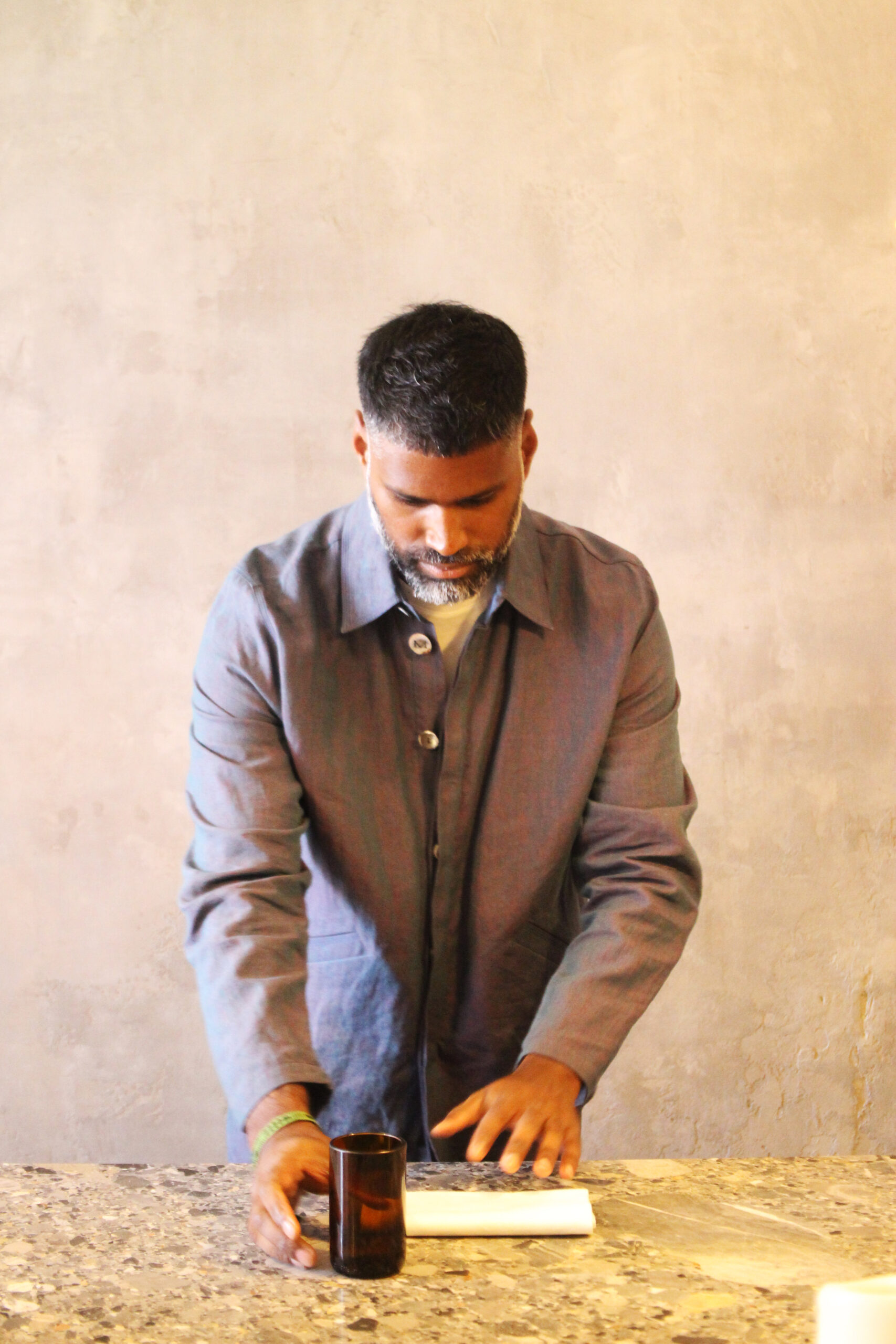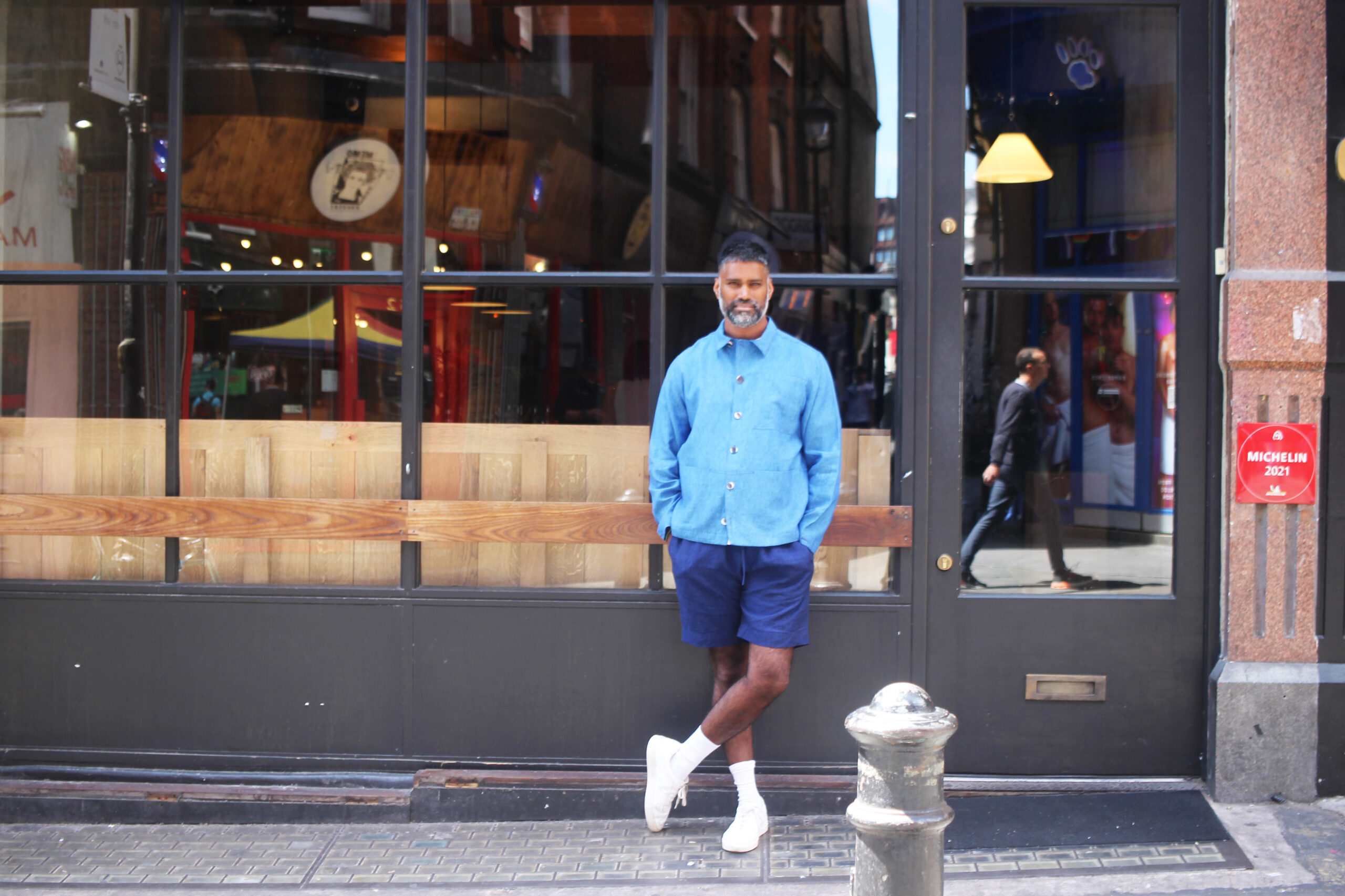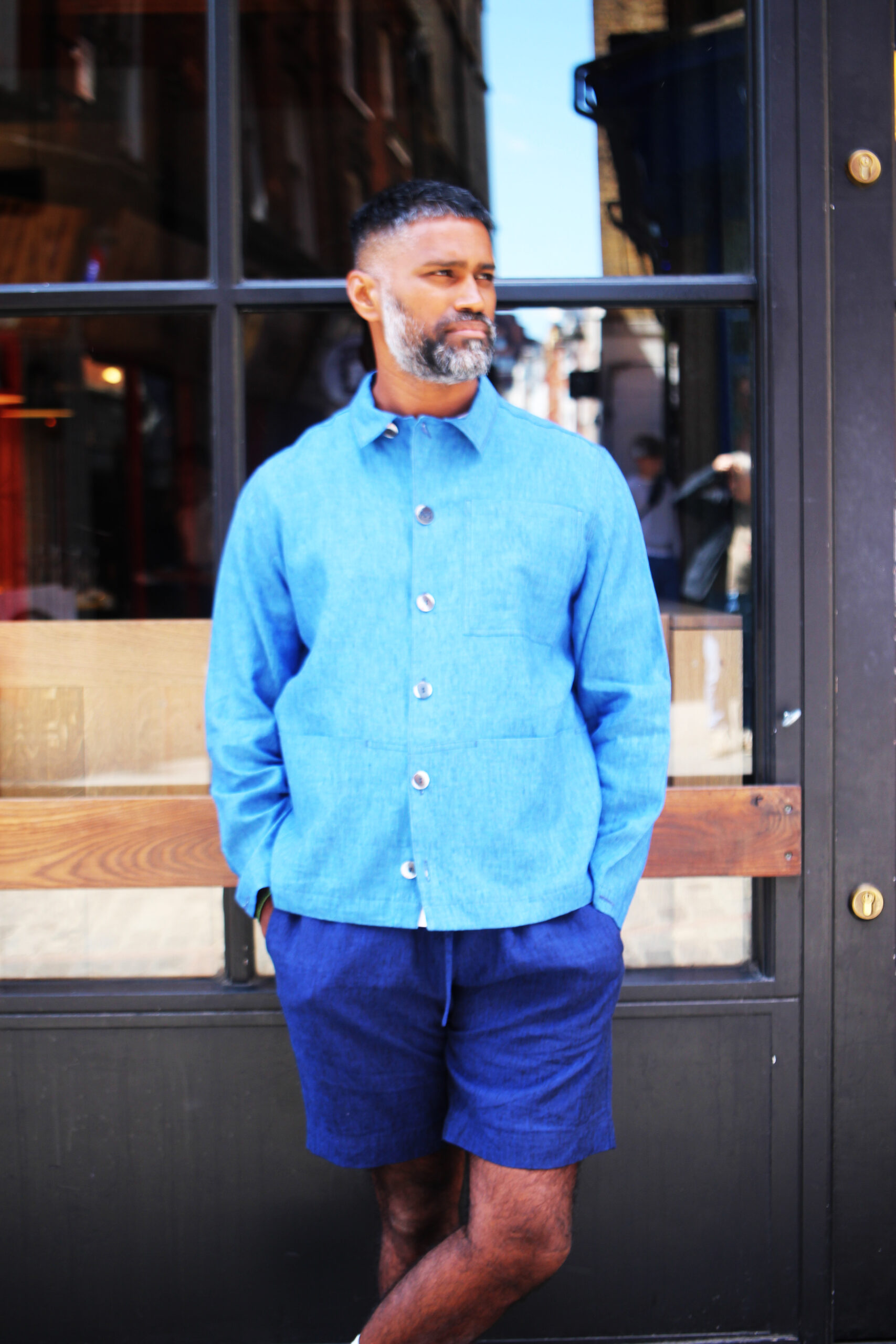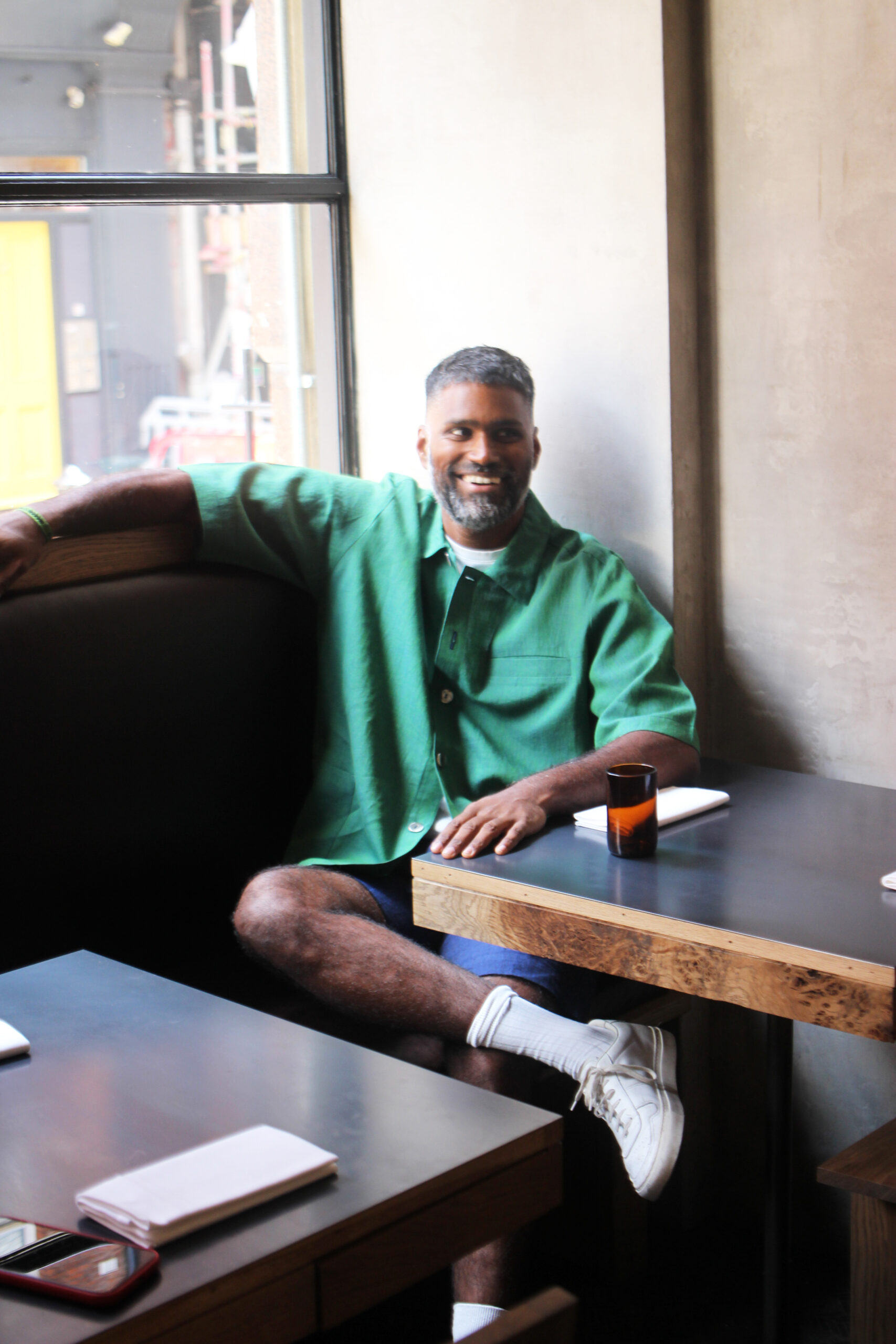DOM FERNANDO, PARADISE

Based in Soho, Paradise blends Sri-Lankan and British produce into a unique culinary experience. Challenging traditional expectations, Paradise offers an ingredient focused journey with a fiery island accent – rooted in unfamiliar flavours and innovation. Crafted by Dom Fernando, it’s a brilliant space with incredible atmosphere and a phenomenal menu.
Recently refurbished with all sorts of changes going on, Debbie and Paul spoke with Dom about Sri Lanka, family influence and community…
Debbie Missing: It’s so great to see the new look Dom, it’s really beautiful. Have you changed the menu up as well?
Dom Fernando: Thank you! Yes, we’ve gone from an a la carte to a six course tasting menu now, so it’s like a wild departure.
Debbie: And what was your thinking behind that?
Dom: Various things. First of all, the restaurant’s four and a half years old, and I’ve personally evolved over the four and a half years as well. It was, and is, my first restaurant, and I’ve evolved as a restauranteur over that time as well, from when we opened, through the pandemic and after. The world of hospitality’s changed as well, people really go out now for the experience, especially being in Soho – Soho restaurants used to be pre-theatre, come in, then go out, or ‘out out’ and that’s definitely changed. We’re about to open an 11 seater chef’s table in Sri Lanka for the first time, so I was thinking, how can we progress modern Sri Lankan food here in London? You’ve got a lot of traditional rice and curry restaurants, but Sri Lankan food hasn’t done what the Thais and Italians have done in terms of moving their food culture forward, so that’s why I was a bit like, ‘I’ve evolved, I’ve got a bit bored, I really want to do something different and I really want to push Sri Lankan cuisine, and now felt like the right time to do it, so in Paradise one, in its old format, you couldn’t really do that, and so that’s why we refurbished the restaurant, repositioned the brand to be a bit more premium. I’d like to say we’re going to bat higher in the coming weeks, months or years and try to go for a star or something like that, to really put Sri Lankan food on the map and not be just somewhere you come and go for a really good meal. And that’s delivered through the experience of a place as well.
Debbie: I think so too. We’ve talked about this before with other chefs and it’s everything, it’s the atmosphere that you create, it’s the service, it’s the interaction we talked about, as well as the food.

Dom: Absolutely. And the drinks as well. Our General Manager and puts together a wine list and she’s the only person in the country who’s actually pairing wines to modern South Asian Sri Lankan food, which has got a distinct spice profile as well. And you know that’s really hard to get right. The guys at Kiln have done that really well with the fiery Northern Thai flavours, but nobody’s done it in our area, so there’s lots of opportunities, and there’s lots of opportunity to educate people as well, on ingredients etc, and that’s why we’re opening
in Sri Lanka as well, because it’s sort of stuck in a buffet mentality, and we want to develop and elevate the country status of being a culinary hub in South Asia, and that’s why we’re doing a lot of work to and from there.
Debbie: And is the food in Sri Lanka regionalised as it is in India?
Dom: Yeah, it’s sort of much smaller regions, because the country’s so small – it’s like 250 miles wide by 300 long and not as vast, we don’t have the breadth that India does, but there are very distinctive coastal flavours, which I guess is more like our sort of food, just because that’s how I was brought up, in and around that area, spending a lot of time with my family there – and then you’ve got Northern Tamil Sri Lanka, which is a lot more influenced by South India. The flavours are a lot more fiery, and Cynthia who owns Rambutan does a great job of presenting that to London as well. So that’s where we’ve got to – you’ve got different people doing different things with Sri Lankan foods, and we’ve got a unique opportunity to take it to the next level, so that’s why we decided to reposition it.
Debbie: I think the customer wants to be educated now. The customer has travelled and has a lot more knowledge.
Dom: Yeah, I agree with you. And also, our job is more than just restauranteurs. We’ve now got a creative lead who does all of our photography. She’s based out of India, we took her to Sri Lanka, we brought her here for three weeks and she’s really trying to tell our story through both photography and videography about modern Sri Lanka. There’s a lot of stuff about old Sri Lankan history, but actually looking forward, who are the people that are making amazing clothes in Sri Lanka? Or really progressing the arts scene? It’s our job to try and tell that story in London. And so that’s part of our job now, to build a brand in and around that, not just give people a great one hour eating experience. So there’s lots of synergies between us.
Debbie: It’s elevating everything, isn’t it?
Dom: Absolutely.
Paul: So you work a lot with British food producers, I know for their seafood – has that changed the way you cook in any way? Do the ingredients and flavour profiles change things at all?
Dom: I think it just enhances. I think any time you’re using small suppliers who take a lot of care over what they do, if you look at anything from craftsmanship through to picking the best quality produce because they’re passionate about it, I think it absolutely comes through in the food, and the way it’s delivered by us as well. From day one it’s what we’ve done, but we are now trying to focus more on that as well. And it’s not just the food, it’s the wine producers as well, so we’re going to go over to Germany as well. We’ve got a Paradise Riesling being produced by a natural wine producer, so we’re going to go spend some time with them to see how they actually do it, because I think as consumers, we sometimes really focus on the price and what the end product looks like and we don’t always think about what goes into the thing.

So take this photo, this is our cinnamon production unit on the south coast of Sri Lanka. Cinnamon is such a key ingredient for us, but from the way it’s grown and harvested, to the way it’s then dried, to then how it’s peeled, to then making its way to England to then be made into powder or to be used as a whole spice in food to then be delivered to the customer. If you think about that journey and what it’s gone through, it’s pretty phenomenal how many people’s hands and minds have touched the experience along the way, and I think that’s what we’re trying to highlight. And I think the same goes for our producers here, from the fishermen down in Cornwall and up in Scotland, it’s like “Right, what time are you going out in the morning?” and going out fishing with them, going deep sea diving for scallops, you know, there are two or three people doing this, going to the deepest depths to get 200-300 scallops to then be brought back on the boat, to be transported to us, to then be cracked, to then be grilled, to then go on the plate – that’s a plate that’s been handmade either in Sri Lanka or in Camberwell by one of our ceramicists. That whole journey is what we’re trying to highlight.
Paul: What you just explained there, about the cinnamon production, that process is almost identical to the production of Flax, which makes linen.
Dom: Oh really?
Paul: Yeah, they call it retting, where they hang it out to dry naturally, in the fields, and then it’s beaten and stripped. Then it goes through three or four processes before it comes through to our weavers in Ireland. And then it’s woven into yarn, and then finally woven in. So again, when you understand the process, or if you can make that understood, people have a much greater appreciation for something because, you don’t just pick it off a tree and it doesn’t just arrive on a spool, or on your plate.
Dom: Absolutely. And especially in the world we live in right now, right? We have to tell those stories, otherwise we’re just going to get lost in consumerism.
Paul: Completely.
Dom: People are just going to be focussing on price and we all know how this is going to go. So it’s exactly the same philosophy.
Time for a wardrobe change…

Paul: (To the team) He’s a bit shy though, isn’t he?! I mean, if you could just lighten up a bit Dom!
A lot of laughter…
Dom: Look I’ve got these corners of lighting down now! I’ve got the angles sorted, I’ve done this before!
Debbie: So, I read your grandmother was a big influence?
Dom: Yeah, that’s her up there actually. It’s a picture of the two of us in Soho, it was taken shortly before she passed away. And actually, there’s a design anthology book up there and on the right hand side there’s a book called the Ceylon Daily Cookbook and that was the first ever cookbook that my grandmother bought, when she was 19 years old, and that’s how she learned to cook.I think she’s been the biggest influence on all of our family’s interest in food. She was a phenomenal cook, right up until she passed away. She brought us all around the table, she would spend hours prepping in advance, cooking for us, and she was a massive influence.
Debbie: And have you tried to adapt some of her recipes?
Dom: Definitely. Her recipes were very authentic, and the thing with Sri Lankan families is that, if you were to come to my mother’s, and if you were to come to my mother’s sister’s, there are subtle difference but you use the recipes as the base and then use slightly different techniques. So our lamb or our steak is marinated in Koji, so it’s going to really break down the fibres in the meat prior to cooking, it’s going to bring out the flavours even more. That’s where we look at different recipes, look at what my grandmother used to cook and think how we’re going to reinterpret that into something. Something like a cashew curry, a really mellow vegetarian curry in Sri Lanka, but we wanted to bring texture to it, so we made a savoury cashew brittle that goes over the curry, that almost acts as something you’ve got to go through to get to the curry, add a little theatre to the dish. At the end of the end of the day, I want people to leave thinking “Wow that was good, when do we book a flight to Sri Lanka?”.
Debbie: And you want people to recommend, to talk about it, and bring people along for the experience.
Dom: Absolutely.
Debbie: Where is the restaurant going to be in Sri Lanka?
Dom: It’s going to be in Colombo Three which is a neighbourhood in Sri Lanka. We’ve taken over a two storey house and we’ve turned the garage into the entrance bar, then we take you upstairs and we’ve created a U shaped eleven-seater chef’s table with live fire cooking, so all eleven are seated around that table having dinner together and then you get moved to the front of the building for dessert and cocktails to finish. It’s a whole immersive experience, but it’s all high rise buildings and ours is the only two storey building. So you’ve got people’s washing hanging out, and you’re in this super luxury dining experience, near the sea, near people’s washing, but this is very cool design, it’s all made out of brick as well, so it’s very different for Sri Lanka as well. We looked at the Balearics, at Mexico, and wanted to pick strands of design we like and incorporate that with Geoffrey Bawa in Sri Lankan design as well.
Paul: That sounds a bit like some of the places we went to in Vietnam.
Dom: Oh, very similar.
Paul: I just love the aesthetic of four million cables, with everything going on. It’s the juxtaposition of chaos with this little island in the middle, I love it. It’s so cool.
Dom: And that juxtaposition is what we’re going for. Our market will be predominantly people travelling from Europe or from Asia, not really locals, and they’ve done their tour of Sri Lanka, they’ve stayed in their luxury resort, and when they come back to Colombo I want to give them a really unique experience of luxury and real life.
Debbie: And the fact that it’s eleven people, that just adds to it and heightens it.
Paul: It’s really special.
Debbie: And do your team go out to Sri Lanka?
Dom: Yeah, The team go out generally every 3-6 months, but when we shut down the restaurant to refurbish, I took generally all of my team – except Hannah who was running the refurb – out there, for a pop up event we did over there, to start seeding in the open door policy there. So I took two chefs, one bartender, Nick my operations lead, we all went over and it was a lot of fun. And we’re teaming up with the team at Three Sheets…
Debbie: We actually just spoke to them! (you can see our conversation with Noel and Max here – LINK)…
Dom: Oh wow! They helped us work up our Paradise drinks list, and we’re actually taking them out to Sri Lanka at the end of the month to film the boys and I bar hopping, making some cocktails, some ingredients and looking at how Arrack is made – it’s fermented coconut, it’s our national alcohol – so we’re sort of working with small businesses, creating really cool content that engages and educates.
Debbie: So you’re creating your own community of like-minded people.
Dom: That’s exactly it. And very similar to you guys as well. I really love the pieces and I love what you do, I love how many synergies there are.
Debbie: Thank you. Gosh I really want to go to Sri Lanka now, you’ve done a wonderful job!
Dom: Excellent! I am Sri Lanka’s hype man!
Dom wears the M02 Chambray 3 Pocket Jacket, the M04 Emerald Short Sleeve Shirt, the M004 Indigo Shorts, the M01 Teal 2 Pocket Jacket and the M003 Teal Tapered Trouser.
4th July 2024
Paradise, 61 RUPERT STREET, LONDON, W1D 7PW
Photography Izy Dixon